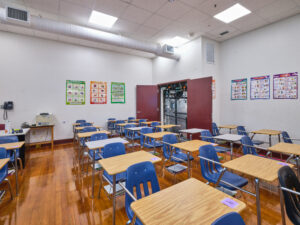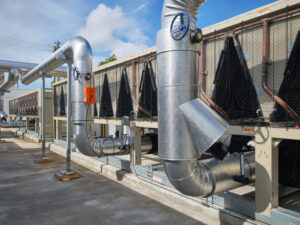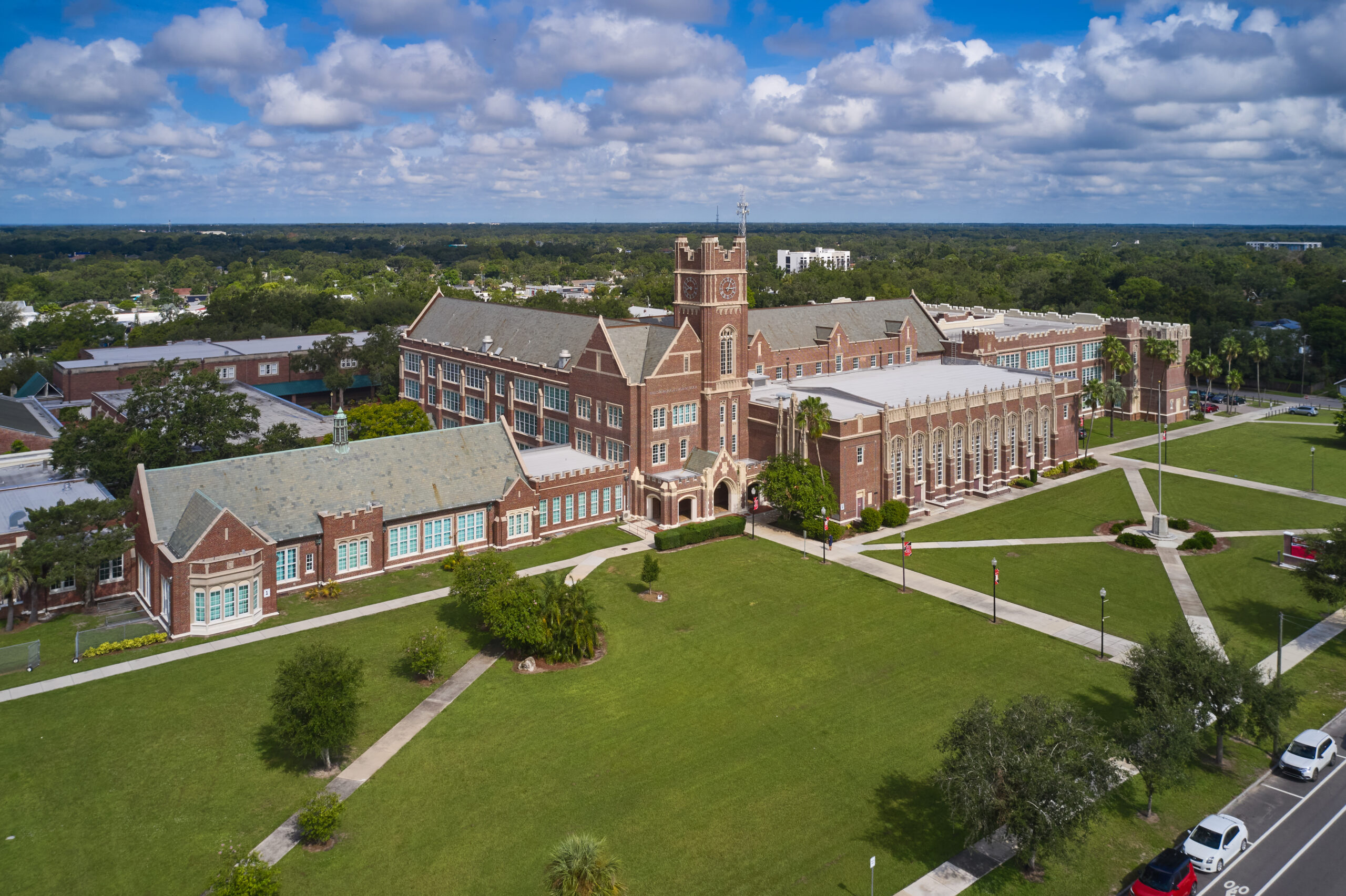Photo: At Tampa’s Historic Hillsborough High School, swing spaces played a key factor to success in the $16 million HVAC overhaul. | Photo Credit (all): Courtesy of JE Dunn
By Curtis DeLaquil
In July 2025, the U.S. Census Bureau estimated public educational construction spending at $111.7 billion. School campuses across the country are ripe for renovations, expansions, and rebuilds as public schools address aging facilities and an influx of new students. In Florida alone, the population is projected to climb to nearly 26 million residents by 2035 – a more than 2.6 million increase from 2025. This growth translates directly into more students, more classrooms, and more need for modern, safe learning environments.
School construction presents particular challenges when work takes place on an active school campus. Unlike a closed jobsite, schools are often undergoing renovations while fully operational during the academic year, with students moving between classes and activities, and a steady flow of traffic at arrival and dismissal.
These projects require careful planning to ensure minimal disruption to students, teachers and administration alike. When managed well, construction becomes nearly invisible to the campus community, allowing the school to move forward seamlessly with improvements that will serve them for years to come.
It’s All in the Details

Operational campuses typically follow predictable patterns of activity, especially around arrival and dismissal. Beyond the daily schedule, schools and the builders must plan around academic testing periods and special events that require quiet or uninterrupted learning. Coordinating with administration to understand these patterns, then planning accordingly, can ensure a seamless partnership and minimal disruption to the campus. For example, arriving before peak traffic hours prevents congestion and alleviates safety concerns.
Weeki Wachee High School in Brooksville, Fla. highlights the importance of coordination. Recently, JE Dunn completed construction of a precast concrete building structure for a new classroom building that is located in the middle of the school’s bus loop. Careful planning and critical execution to complete this work during summer was the only successful plan around traffic flow – and ensured that the project moved forward without disrupting student transportation.
Certain spaces, such as media centers or administrative offices, cannot be taken offline during the school year. For these areas, summer becomes a critical window for work, allowing projects to move forward without disrupting essential operations.
In 2025, the Tampa Bay Business Journal reported that in Hillsborough County School District, one of Florida’s largest school districts, “63 schools are closed or partially closed over the summer for major projects. Eight projects are what they consider ‘large undertakings,’ while the others may include smaller upkeep like repaving driveways, replacing a chiller or installing new windows.”
Safety is Paramount
Safety and security are obvious priorities on an operational campus. All workers should be fully badged and background-checked regardless of how small their role. Additionally, strict compliance reassures administration and staff alike that student safety remains protected at all times.
In addition to considering exterior traffic patterns, interior traffic should be considered. Construction teams should note major circulation paths inside the school, such as hallways between classrooms and cafeterias. By staying out of these high-traffic areas, workers remain “invisible,” allowing the school day to proceed uninterrupted.
Pre-Planning Pays Off
Minimizing disruption requires looking ahead. Pre-manufacturing and pre-ordering equipment whenever possible ensures that critical materials are available when needed. This becomes especially crucial for the big summer push that many construction firms encounter.
“Pre-planning might be one of the most important aspects to a project’s success, and one that is oftentimes overlooked,” said Jake Nellis, vice president of JE Dunn’s Tampa office. “Having the right supplies and equipment staged and ready allows teams to hit the ground running and finish work before staff and students return.”
Embrace Swing Space

School renovations often require classrooms to be temporarily vacated. In these cases, “swing space” provides a flexible solution. The key is identifying unused rooms that can absorb displaced classes without the cost of portable units. Some schools have up to five or six classrooms available that can be repurposed for this need.
This type of rotation depends on accountability of keeping work on schedule and strong planning and clear communication. Teachers and students must know weeks in advance when and where their classes will move. Providing four to six weeks of schedules creates predictability, and even a simple weekly update to students, i.e. “English will meet in Room 312 next week”, helps avoid confusion and builds trust throughout the project.
At Tampa’s Historic Hillsborough High School, swing spaces played a key factor to success in the $16 million HVAC overhaul. While a portion of this project was able to be coordinated over the summer, it also took place during the academic year, and careful consideration had to be given to ensure students were not impacted. JE Dunn’s team worked closely with administrators to identify and rotate in and out of swing spaces, or six classrooms at a time while replacing air handler units. Once one set of rooms was completed, those spaces were returned and another set was taken offline. Ultimately, a new central energy plant with new chillers, 17 air handlers, and 157 air volume control units were replaced without interrupting instruction.
Collaboration is Key
School construction is about more than physical upgrades. It requires partnership with administrators, teachers, students, and families. By listening closely, communicating clearly, and aligning with the rhythms of campus life, construction teams can deliver facilities that address urgent needs while keeping learning on track.
Curtis DeLaquil is Group Manager at JE Dunn Construction and President of ACE Mentors of Tampa Bay.


